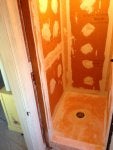Ok tile gurus. I am a GC writing specs for a custom tile shower installation.
I have some guys telling me that a Kerdi type system is the only way to go. And.... Other guys telling me that they would never use a Kerdi system and that traditional install is the only way to go.
It seems like one of those new school vs. old school debates and nobody has given me enough evidence to have me convinced either way yet.
What do you guys think the advantages to either method are. Cost and time not a significant consideration within reason (not looking to double the cost of the install). I want to provide the BEST product for my clients. Call backs are not acceptable.
Thanks!
I have some guys telling me that a Kerdi type system is the only way to go. And.... Other guys telling me that they would never use a Kerdi system and that traditional install is the only way to go.
It seems like one of those new school vs. old school debates and nobody has given me enough evidence to have me convinced either way yet.
What do you guys think the advantages to either method are. Cost and time not a significant consideration within reason (not looking to double the cost of the install). I want to provide the BEST product for my clients. Call backs are not acceptable.
Thanks!









